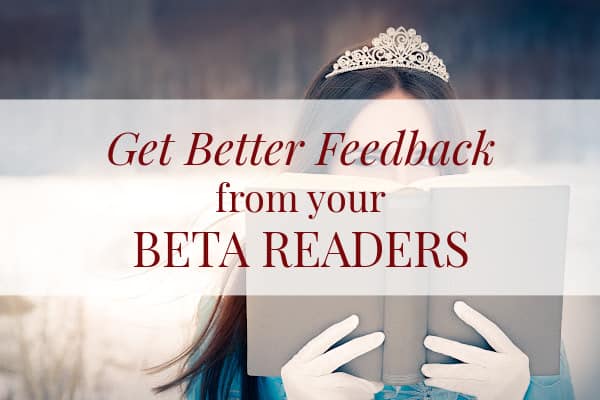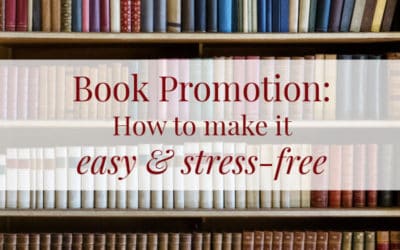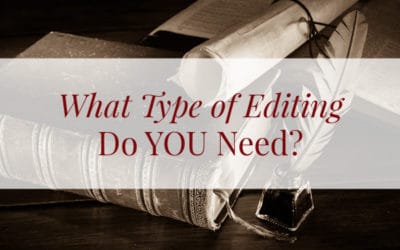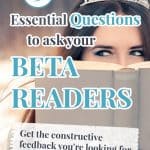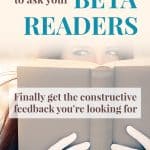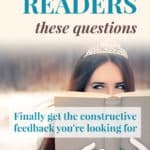15 Questions to Ask Your Beta Readers
Beta readers are an excellent resource for authors, especially if you’re on a limited budget. But to get the most out of the process, and to really take your revisions to the next level, you’ll need to guide your beta readers through the process by asking them the right questions.
You don’t want just any feedback. You want feedback that will help you identify what issues are present in your story so that you can resolve them and up the quality of your novel.
In this article, I go through some of the most important questions that you’ll want to ask your beta readers and provide advice for how to fix the problems that they bring to your attention. This information will also be helpful for any beta readers interested in learning more about what to look for and how to help the authors you’re working with.
(Most beta reading is done for free, and this is primarily what I will be talking about. Paid beta readers also exist, but that isn’t something that I’ll specifically be covering here.)
Why Write Questions for Beta Readers?
When you work with beta readers, you are the one who needs to give the process some structure. This is for three reasons:
- Beta readers are untrained. They may have some experience, but skill levels will vary and you can’t count on them to know what they’re doing. So you have to help them out by letting them know what you’d like them to do in a way that is clear and specific.
- Beta reading is free. They’re giving you their time without asking for anything in return, so you want to make their job as easy as possible.
- It’s your book. You’re the expert on your novel, so you’re the person most qualified to figure out what it needs help with.
Whenever you work with a beta reader, you need to tell them what you’re looking for and make it clear what your expectations are. And asking the right questions is the best way to do this.
It will make their job easier because they’ll know exactly what you’re looking for and they won’t end up wasting time in areas that you aren’t looking for help with. It will also increase your ability to get the valuable feedback you need to conquer the revision process.
Types of Questions to Ask Beta Readers
When you’re working with beta readers, your goal is to get a sense of what works and what doesn’t. You aren’t looking for advice on the best way to fix any problems that turn up, because beta readers aren’t qualified to give that type of feedback.
It’s okay if they give you ideas, but you need to carefully judge whether those ideas objectively fit well with the story. Following the wrong advice can create new problems or even make the existing problems even bigger.
It’s important to ask each beta reader questions that will help them pinpoint what could be going wrong in your book. This will be more useful than asking questions about how to fix potential issues. You can probably figure out how to fix most problems yourself, so you primarily need their help to figure out what needs to be fixed in the first place.
Beta Reader Questions About Hooking Your Target Readers
The beginning of your story can be hard to get right, though reading my article on how to hook your readers will help you get on the right track. Beta readers don’t always know what to look for to see if your opening pages are doing what they need to do, so these questions will help them give you the feedback you need.
1. Does the opening chapter/prologue hook readers? Will the target audience keep reading past the first sentence? The first paragraph? The first page?
The opening chapter is usually Chapter 1 unless the novel has a prologue. If there’s a prologue, then the prologue is the opening and needs to hook your readers.
If you have a shorter prologue, for example, a single page, the prologue needs to start the process of hooking readers, but the first chapter still has a significant role in getting readers invested in the story and convincing them to keep reading.
2. How well does the opening represent the rest of the novel? Will it attract the people most likely to enjoy the story overall?
When your opening does a good job representing the novel as a whole, it will draw in readers who will enjoy the rest of the novel. This means it needs to be written in a similar style and cover themes that will be echoed throughout the story.
For example, if you’re writing a light-hearted comedy, your opening needs to be funny and stay away from serious themes. If the story is very dark, make sure the darkness comes across from the very beginning.
3. Is the genre clear from the beginning? Do readers know what kind of story they’re getting into?
You need to establish your genre early on to attract your target readers. Your ideal audience will be made up of people who love your genre, so you need to make it clear that your book is for them.
For example, if you’re writing a romance, you might have the main love interests meet on the first page. Or you might focus on just one of the main characters but drop strong hints that this character is looking for love or will soon find themself in a relationship.
If you’re writing fantasy, you’ll want to make it clear that the story is taking place in a completely different world, or a slightly different version of our world, depending on the sub-genre. Getting some kind of magic on page one will often accomplish this.
Beta Reader Questions About Characters
Your characters can make or break your story. Asking your beta readers how they view the characters after reading the story will help you pinpoint any areas that need extra work.
4. Are the main characters likable and/or relatable? Did anything get in the way of them being likable or relatable?
Not all characters need to be likable people, but in most cases, they’re important characteristics for your main character to have. And if any of your characters are less likable than you thought they were, that will be good to know.
5. Do the main characters feel three-dimensional?
You want your characters to be complex and interesting. If there’s something missing, beta readers might be able to pick up on it.
6. Is it easy to identify the main character’s goals and motivations?
Having clear goals and motivations for your characters helps readers find them believable and relatable. If they’re unclear, you’ll want to find a way to remedy that.
Beta Reader Questions About Setting
If you’re writing fantasy, and even if you aren’t, your story’s setting can be an important part of your novel’s success. It’s easy to end up with holes in your worldbuilding, either because of how you created it or issues with how you’re conveying it to readers. You may be too close to the work to realize where they are, and that’s where beta readers come in.
7. Does the worldbuilding feel real and believable?
If the worldbuilding doesn’t feel real, this could be a sign that either you haven’t put enough worldbuilding detail into the story or that there are internal consistencies that make it hard for readers to suspend disbelief.
8. Are there places with too much exposition or backstory?
Exposition can pull readers out of the story, so you never want too much at a time. If you do have too much exposition, find ways to either cut back on it or make it more relevant to the story so readers will stay interested and engaged.
9. Is there too much description in some places or sections that could have used more?
It’s hard to find the right balance between giving enough description to make the setting feel vivid and not giving so much that readers get bored. Your beta readers can stand in for your target readership and let you know how you currently stand.
Beta Reader Questions About Plot
If you want to retain your readers’ interests, you need an engaging story. The plot needs to be interesting, and it also needs to make sense and be free of plot holes.
10. How is the pacing? Do any sections move too slowly or feel rushed?
It’s hard to get the pacing right, and often beta readers can give you a sense of where to speed up the story to keep things interesting and where to slow down and take extra time.
11. Does the story make sense and feel believable? Are there any sections that don’t?
The plot needs to make sense, or readers will lose interest. Beta readers can often identify a few plot holes that you missed, and the more you can encourage them to be specific, the better. Whenever you find something that could prevent your target audience from suspending disbelief, that’s something you want to fix.
12. Is there enough conflict for the story to feel compelling and believable? Is it resolved satisfyingly?
Stories are driven by conflict, and if there isn’t enough of it, it can feel like the actions of the characters don’t matter. If there isn’t enough conflict, find a way to up the stakes. If the conflict isn’t adequately resolved at the end, find a way to tie things up a bit more.
General Beta Reader Questions
13. Is there anything you’re still confused about at the end of the story?
This is a good catch-all question to get out any plot holes or inconsistencies that beta readers may have noticed.
Sometimes they’ll bring your attention to things that were explained or resolved and the beta reader just missed it. When this happens, remember that most readers will only read your book once before deciding whether they like it or not. If something isn’t explained in a clear enough way that readers will pick up on it on their first read, it has the same effect on readers as an unresolved loose end.
The fact that something is left unresolved doesn’t necessarily mean it must be fixed. If it’s resolved in a sequel, or if it’s intended to remain a mystery, you may choose to keep things as-is. But if beta readers are annoyed by it, consider making adjustments.
14. Did anything surprise you positively or negatively?
This question can give you insight into how effective your writing is around any plot twists or big reveals. It can also point out potential areas of concern if there are events that were surprising when you didn’t intend them to be.
Readers enjoy surprises because they keep the story interesting. If your beta readers predicted your big plot twists, drop fewer hints or find ways to make them more subtle.
If the plot twist came out of nowhere and didn’t feel believable, surprising beta readers in a negative way, drop more hints. You want readers to be surprised, but you also want them to keep suspending disbelief.
15. Was there anything you particularly liked or disliked?
This broad question will give you additional information about what you’re doing well and what could use work. Your beta readers should be representatives of your target audience, so the things they like and dislike will often be things that your audience more broadly will like or dislike, especially if you’re hearing similar things from multiple beta readers.
Your Beta Reader Questionnaire
You want your beta readers to be thinking critically about each element of your story as they’re reading. This means that you want to give your questions to your beta readers before they start reading your book.
I recommend sending your questions at the same time you send the novel, along with a note that you’d like them to look over the questions first so they have an idea of what to look for. You could provide the beta reader questionnaire as a PDF, or you could type the questions out in an email. You could even put them on the first page of the manuscript.
Handling Questions that Include Spoilers
If you have questions about specific scenes or specific decisions your characters make and want to avoid giving your readers spoilers ahead of time, you can provide these separately after they have read the full manuscript.
Bear in mind that people won’t necessarily go back and review the relevant sections of the story as they’re answering the questions. It could be worth including spoiler questions from the beginning if you really want the beta readers to answer all your questions, but it will depend on the situation.
Incorporating Beta Reader Feedback
Beta readers are untrained readers who share their opinions of what worked and what didn’t.
You don’t need to implement all of the feedback that you get. It’s often good to be selective about which advice to follow and to make sure you’re making the best choices for your story.
(If you’re the beta reader, it won’t hurt to occasionally remind the author that you’re just sharing your opinion and they only need to follow your advice if they think it works for the story. This will take away any pressure to give perfect advice while also making it clear to the author that when you do say that something is objectively an issue and needs to be fixed, they should listen to you.)
You’re likely to get a variety of responses, and some may contradict each other. This is okay, and you don’t have to please everyone.
There are always going to be differences of opinion, and what matters most is that you’re writing a book that you’re proud of. The people with the most potential to enjoy your book are the people most like you, so writing for yourself tends to be an effective way to write for your target readership.
Why You Shouldn’t Do Everything They Say
Beta readers have only read your book once, and most of them don’t have the training needed to give objective feedback. Also, since you aren’t paying them, you can’t expect them to put in the time and energy needed to carefully consider every piece of feedback they’re giving you and make sure it objectively fits with every detail that makes up your story.
When you’re incorporating the feedback you get from your beta readers, you want to make sure that each choice you make fits with the broader story. This isn’t a bad approach for editing feedback either, even though professional editors do have the training and experience to give objective feedback that you can rely on to work with the rest of the story. For more information on what editing is and the differences between it and beta reading, read my article on the five types of editing.
The opinions of people in your target readership are valuable, but they’re just opinions, and it’s your job to extrapolate the feedback you receive to what you think will improve the book for your target audience as a whole.
You Need to Trust Yourself
The readers with the most potential to like your novel are people who like the things you like and who think the same way you do.
This means that if you carefully consider what you think works best for your story, and implement the feedback that fits into your vision for the book, you’re likely to be doing what’s best for your target readers as a whole.
It’s essential to trust yourself and your judgment. Avoid prioritizing other people’s opinions above your own, because you’re the one who knows your book and your audience the best.
If you’re at the beta reader stage and have your novel fully drafted, now is a great time to start the marketing process. The earlier you start, the larger your following will be by the time your book is published. By starting early, you can avoid a lot of the stress and overwhelm by doing a little at a time and gradually building on your marketing skillset.


